HKTDC helps businesses connect with Thai officials and discover market opportunities
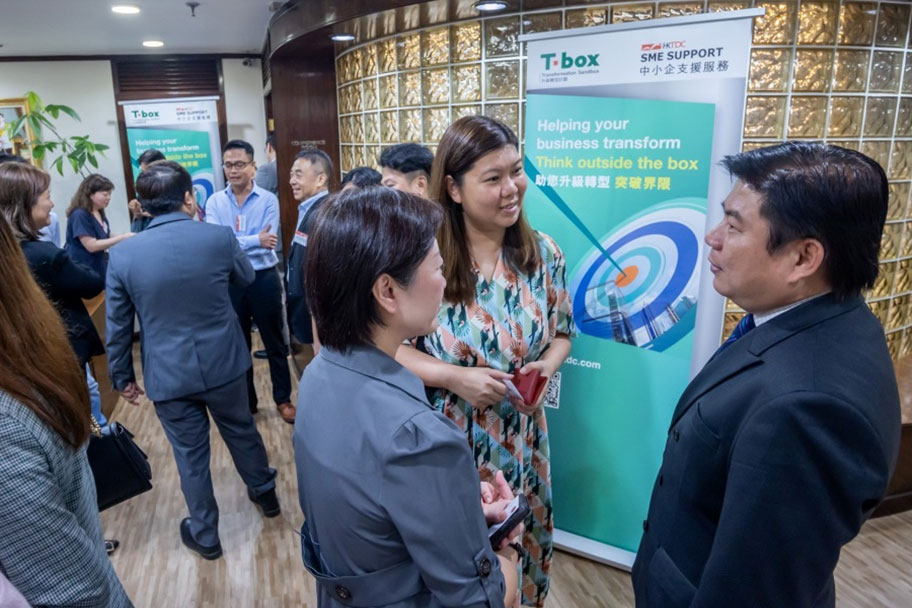
Thailand has emerged as one of the most favoured destinations for Hong Kong exporters seeking to expand their markets.
Thailand offers an attractive business environment based on its large youth population, a rapidly growing middle class, advances in information technology and increasingly developed infrastructure.
Two local SMEs discovered these advantages during a recent visit to the Thai Consulate General in Hong Kong, organised by the HKTDC’s Transformation Sandbox (T-box) business support programme.
Baide Juye Group produces cosmetics and beauty products and intends to invest HK$10 million (US$1.3 million) to set up a production line in Thailand.
“We became a T-box member last year and took part in a T-box visit to the Indian Consulate in Hong Kong to learn more about the Indian market,” said Group President Mr Huang Shao-ju.
“This year's visit to the Thai Consulate-General allowed us to learn more about the requirements for setting up a cosmetics factory in Thailand, including how to obtain a licence from the Department of Business Development and the process of applying for a Foreign Business Licence.”
Andy Cheung, Director of garment manufacturer Ludwick Ltd, said that they had attempted to enter the Thailand before the pandemic, but lacked understanding of the local market. “We currently export our clothing products to Singapore, Malaysia, the Middle East and other places. Thai clothing is light and thin, which is our ideal sales market. This visit has enabled us to meet Thai representatives and learn about the details of entering the Thai market.”
With a population of more than 66 million, Thailand’s GDP exceeded US$500 billion last year, giving it a per capita GDP of US$7,300. The per capita figure increased 2% compared to 2022, reflecting the continued rise in local incomes, which will help drive consumption and overall economic development.
According to Consul General Chaturont Chaiyakam, under the Thailand 4.0 strategy, the country's manufacturing sector is moving up the value chain and leveraging the power of innovation and technology to transform the economy and improve livelihoods.
A priority development is the Eastern Economic Corridor, which will focus on smart electronics, new-generation automobiles, digital services, high-end medical and healthcare tourism, biotech and future food products.
On the trade front, Thailand encourages free trade and continues to launch incentives to strengthen its position as a preferred investment destination. These include a range of business tax exemptions and discounts for foreign investment projects.
Trade between Hong Kong and Thailand is flourishing. From January to July this year, total bilateral trade exceeded US$9.2 billion, representing an increase of 23% over the same period last year.
While the value of goods imported into Hong Kong (US$6.5 billion) exceeds those in the other direction (US$2.6 billion), exports from Hong Kong to Thailand are growing strongly, with a 74% increase in the first half of 2024 compared to a 10% increase in the value of imports.
Free of charge, T-box is open to all companies registered in Hong Kong and provides participants with a tailored package, including advice, workshops, market insights and networking opportunities. In the past four years, over 4,300 SMEs have participated in the three-month programme.
Original article published in https://hkmb.hktdc.com
Editor's picks
Trending articles
AFC Capital Partners eyes new sources of capital in Hong Kong
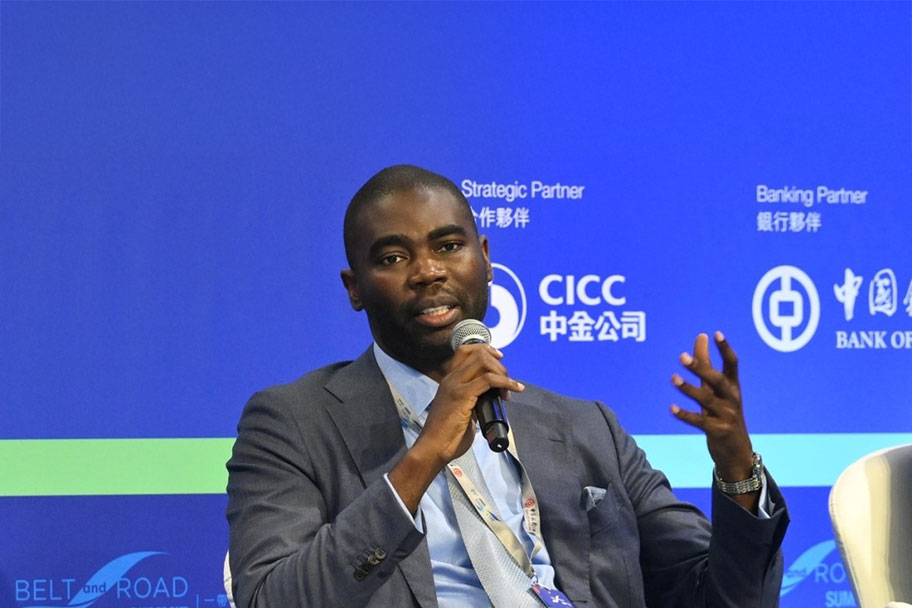
Africa stands on the brink of an economic transformation, thanks to a young population and an abundant supply of the natural resources and critical minerals that the world needs to decarbonise.
Elie Aloko, Vice President, Business Development at AFC Capital Partners (ACP), is engaging investors around the world – from Asia, in particular – to turn this promise into reality.
ACP is the asset management arm of Africa Finance Corporation (AFC), an investment-grade multilateral finance organisation established in 2007 to accelerate industrial and infrastructure development in Africa.
To date, AFC has invested over US$13.5 billion across 36 African countries.
“We want to see more investment coming from Asia, to develop infrastructure and set up productive industries in Africa,” Mr Aloko said, speaking to Hong Kong Means Business at the recent Belt and Road Summit in Hong Kong.
“It’s no longer a story where Africa is a solution to the world by providing the natural resources, but how Africa can be part of that solution with globally competitive industries, creating value through local manufacturing and processing,” he added.
ACP was established three years ago with a mandate to manage capital from African and overseas institutional investors – such as pension funds, insurance companies and sovereign wealth funds – to help diversify AFC’s sources of funding.
These investors tend to be unaware of the opportunities that Africa offers.
“The Belt and Road Summit is a great platform to engage with professional institutional investors, and tell them what is happening in Africa,” Mr Aloko said.
“Whether we like it or not, Asian private and institutional capital has been remote from Africa. We don’t see the traction we want to see.”
Mr Aloko took to the stage at the Belt and Road Summit in Hong Kong to introduce the Infrastructure Climate Resilient Fund (ICRF), which aims to mobilise and deploy US$1 billion in Africa.
The world’s largest multilateral climate fund, the UN Green Climate Fund, has already committed US$240 million to the ICRF.
“We see ourselves as an investors’ gateway to Africa,” Mr. Aloko said. “Our role in the coming years will be to mobilise large pools of capital from all over the world, including Asia, to invest in bankable infrastructure and industrial projects.”
In April, AFC published its first State of Africa’s Infrastructure Report, a new annual study that aims to quantify and prioritise infrastructure investment in Africa.
This report has already helped AFC map out strategic trade corridors and landmark projects that can fast-track sustainable growth in Africa.
Many investors from outside Africa have a high perceived risk on the continent, Mr Aloko said, pointing to a 2020 Moody’s study that showed lower default rates for infrastructure debt in Africa compared to other regions of the world, apart from the Middle East.
“There’s a strong bias in how Africa risk is perceived. We are not saying Africa is without risk, but the perception of risk is higher than what the actual numbers reveal.”
Original article published in https://hkmb.hktdc.com
Editor's picks
Trending articles
Event will host 80+ key officials and business leaders.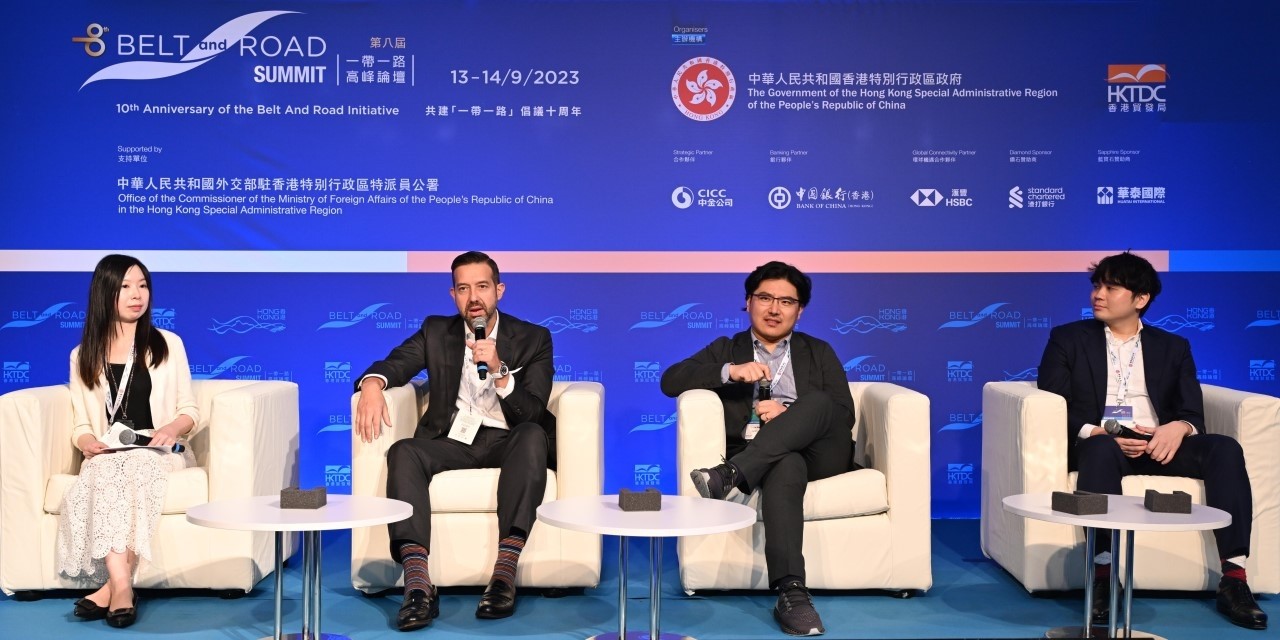
This year’s Belt and Road Summit – a key platform for Hong Kong to promote the Belt and Road Initiative (BRI) – is bringing together more than 80 officials and business leaders to discuss collaboration opportunities in BRI markets.
The Summit, which is taking place on 11-12 September at the Hong Kong Convention and Exhibition Centre, is organised by the Hong Kong SAR Government and the Hong Kong Trade Development Council (HKTDC).
The Business Plenary on the first day – featuring Hong Kong, Mainland China and overseas business leaders – will look at Hong Kong’s role in facilitating cooperation as well as how companies are responding to the current global landscape.
The second day’s Business Plenary will explore opportunities in the Middle East and other Belt and Road markets, another key topic for this year’s event.
“The Belt and Road Summit will deepen international business cooperation and consolidate Hong Kong's position as the preferred business platform for the Belt and Road Initiative,” said Algernon Yau, Secretary for Commerce and Economic Development for the Hong Kong SAR Government.
As China looks for ways to drive more collaboration between Belt and Road markets, Hong Kong can play an even more active role as a global hub for investment, trade and innovation, Mr Yau explained.
Dr Peter K N Lam, Chairman of the HKTDC, highlighted the business support that HKTDC provides to foster closer cooperation, including business delegations and outreach activities to Belt and Road countries and regions.
The main theme for this year’s Summit is Building a Connected, Innovative and Green Belt and Road.
This year’s event is also introducing a Green Chapter, reflecting its focus on sustainability, with thematic sessions on green construction, innovation, finance and more.
Sessions that are part of the Finance Chapter will analyse opportunities to leverage Hong Kong's financial services, while the Youth Chapter will host young business leaders who will share their views on BRI opportunities.
This year’s Summit will also feature two new thematic sessions, on multi-dimensional connectivity and people-to-people exchanges.
Investment and business matching services remain an integral part of the Summit. Business matching meetings will run on-site on 11-12 September and online on 16-17 September.
Organisers expect to match more than 280 investment projects, with more than 800 one-to-one project matching meetings already lined up.
Project investment sessions will focus on four main areas: energy, natural resources and public utilities; innovation and technology; urban development; and transport and logistics infrastructure.
The Summit’s exhibition will gather over 100 exhibitors across three zones.
A Hong Kong Zone will showcase Hong Kong service providers. A Global Investment Zone will present large-scale investment projects and opportunities as well as major cultural and technological developments. An InnoTech Zone will feature cutting-edge innovations and solutions from exhibitors around the globe.
Original article published in https://hkmb.hktdc.com
Editor's picks
Trending articles
Annual event attracted thousands for deal-making opportunities.
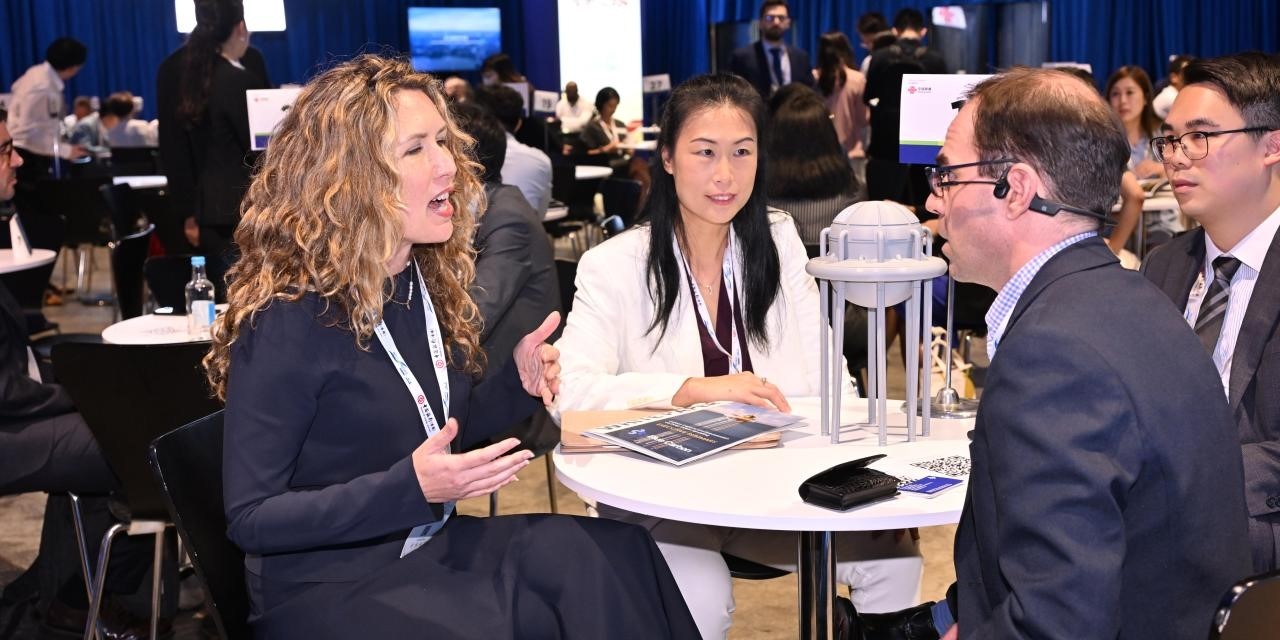
The 9th Belt and Road Summit finished in Hong Kong last Friday, bringing to a close a packed two-day schedule of pitching, deal-making and networking events focused on developing business in the Belt and Road countries and regions.
Under the banner of “Building a Connected, Innovative and Green Belt and Road”, the summit was co-organised by the Government of the Hong Kong Special Administrative Region (HKSAR) and the Hong Kong Trade Development Council (HKTDC) as a key event celebrating the 75th anniversary of the founding of the People’s Republic of China.
Over 6,000 business participants from more than 70 countries and regions attended the event.
Over 280 investment projects were matched at the event in sectors, including energy, public utilities, technology, urban development and transport and logistics infrastructure.
25 G2G and B2B memoranda of understanding were announced between government bodies and companies from Hong Kong, Mainland China, ASEAN - Indonesia, Malaysia, Vietnam - and the Middle East - Bahrain, Kuwait, the United Arab Emirates - Kazakhstan and more.
An agreement between the HKTDC and the Ministry of Commerce of Cambodia promises to facilitate trade missions and business matching between Cambodian and Hong Kong companies as well as promoting Hong Kong's advantages to Cambodian businesses.
Many projects announced at the summit have a focus on sustainability and technology solutions. Farmacy International from Hong Kong and FutureBright Society Enterprise from Australia announced a strategic joint venture that aims to drive sustainability in agricultural innovation and develop scalable green food networks across Australia and New Zealand.
State-Owned Enterprise of Indonesia - Perumda Varia Niaga Samarinda, LINKTA Technologies Holdings from Indonesia and Rainmaker Ventures Holdings from Hong Kong announced that they will cooperate to develop investment in smart chicken farms and agriculture in Nusantara, Indonesia’s new capital region.
More than 110 exhibitors promoted products and services at the summit including more than 50 trade and service enterprises from Mainland China, which highlighted innovative achievements in areas, such as greentech, culture and creativity, cross-border e-commerce, cloud services and big data.
Featured speakers at the summit included John Lee, Chief Executive of the HKSAR, Dr Peter K N Lam, Chairman of the HKTDC, Li Yongjie, Deputy China International Trade Representative of the Ministry of Commerce, Gou Ping, Vice Chairman of the State-owned Assets Supervision and Administration Commission, and Xiao Weiming, Deputy Secretary-General of the National Development and Reform Commission.
A keynote address was delivered by H.E. Nguyen Hoa Binh, Permanent Deputy Prime Minister of Vietnam.
Other speakers included Paul Chan, Financial Secretary of the HKSAR Government, Chen Liang, Chairman of the Board of Directors and Chairman of the Management Committee of China International Capital Corporation Limited, and Dilma Rousseff, President of New Development Bank.
Original article published in https://hkmb.hktdc.com
Editor's picks
Trending articles
A series of agreements are bringing the two regional hubs closer together.
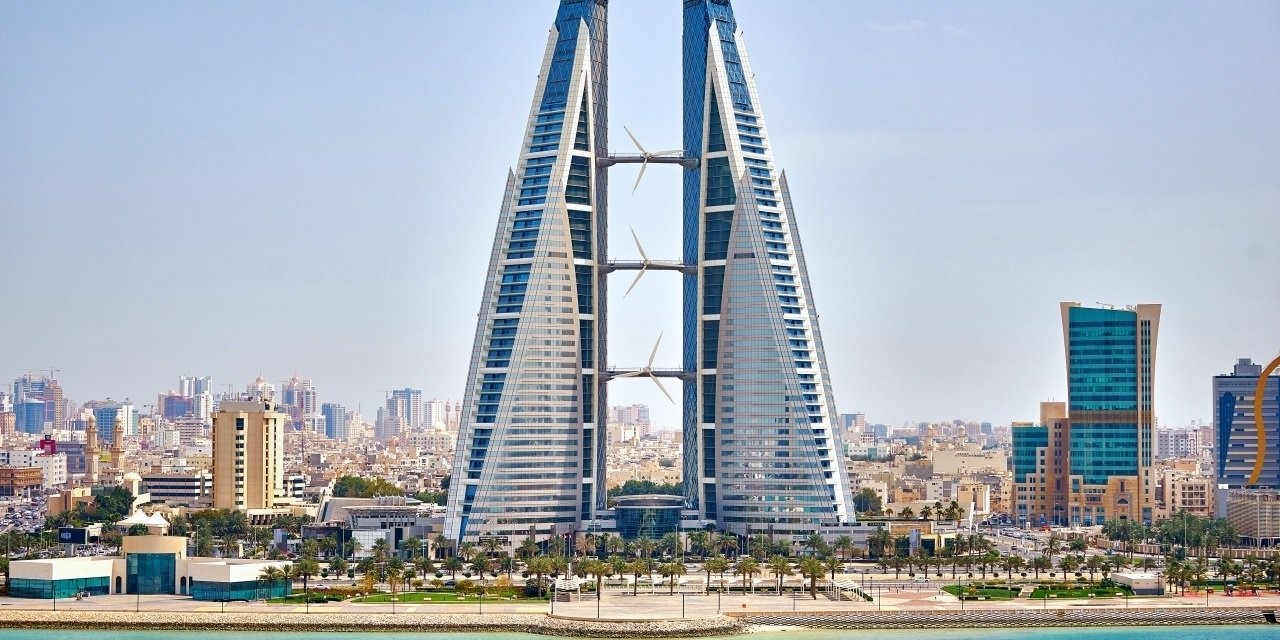
Trade and investment opportunities are continuing to open up between Bahrain and Hong Kong.
The Bahrain Chamber of Commerce and Industry and the Hong Kong Trade Development Council (HKTDC) signed an MoU at September’s Belt and Road Summit in Hong Kong, paving the way for business missions, conferences and training programs as well as new formalised channels for information exchange and collaboration.
“Information flow is important, but human connectivity is even more important,” said Mohamed Abduljabbar Alkoheji, Second Vice-Chairman of the Bahrain Chamber, in an interview with Hong Kong Means Business.
“It is very important that both sides understand each other,” Mr Alkoheji added, emphasising the value of exchange programs for businesses, entrepreneurs and students to foster deeper connections.
Mr Alkoheji spoke alongside other heavyweight business leaders from Belt and Road countries and regions at a Business Plenary session at the Summit, exploring new opportunities created by the Belt and Road Initiative and the role Hong Kong can play.
The MoU follows two major bilateral deals that Bahrain and Hong Kong signed in March: a comprehensive avoidance of double taxation agreement (CDTA) and an Investment Promotion and Protection Agreement (IPPA).
These pacts help create financial safeguards to encourage more direct investment and joint venture deals between the two regional hubs.
As part of the IPPA deal, the Hong Kong SAR Government’s Dedicated Fund on Branding, Upgrading and Domestic Sales (BUD) fund – which provides financial assistance to local businesses expanding abroad – has extended its reach to include Bahrain.
The Bahrain Chamber also signed an MoU with the Hong Kong General Chamber of Commerce in April to help facilitate mutual growth.
Governments from Hong Kong and Bahrain have been engaging more closely in recent years, Mr Alkoheji noted, in a bid to strengthen economic and trade ties.
“Both countries have agreed that we should be focusing more on business relations,” he said. “That's why we've been here. We came here three months ago, and we’re here today. That shows our commitment.”
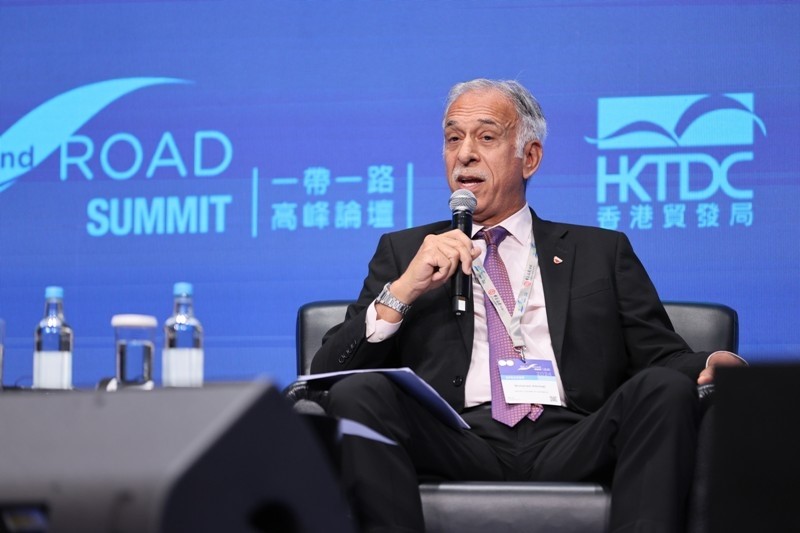
Mr Alkoheji spoke at a business plenary highlighting new opportunities at this year’s Belt and Road Summit
Bahrain and Hong Kong share many similarities, Mr Alkoheji pointed out, as financial and logistics centres that can facilitate access to larger regional markets while serving as gateways connecting the East and West.
In May, Bahrain’s King Hamad bin Isa Al Khalifa and Chinese President Xi Jinping signed a comprehensive strategic partnership, pledging closer cooperation on a range of areas, including investment, transport, renewable energy and the digital economy.
Both Bahrain and Hong Kong are also positioning themselves as innovation centres as part of their development plans, especially as a fintech and start-up hub.
“In Bahrain, we are moving from red tape to the red carpet,” Mr Alkoheji said.
Tamkeen, a labour fund set up to support the growth of the private sector in Bahrain, has provided BD2 billion (US$5.3 billion) in direct and indirect support since it was set up in 2006, with a particular focus on SMEs.
The initiative is an integral part of the Bahrain Economic Vision 2030, a far-reaching program unveiled in 2008 to strengthen and diversify the Kingdom’s economy.
Bahrain’s GDP recorded 2.4% year-on-year growth in real terms during 2023, driven primarily by a 3.4% expansion in the non-oil sector, according to preliminary data released by the Information and eGovernment Authority, while the oil sector witnessed a 2.4% year-on-year decline, making the island nation one of the most diversified economies in the Gulf Cooperation Council trading bloc.
The financial services sector maintained its position as the largest contributor to GDP in 2023, accounting for 17.8% of GDP.
The Bahrain Chamber, which has around 40,000 corporate members, is organised around 10 committees representing different commercial sectors, including technology, health, finance and logistics.
The MoUs that the Chamber has signed can make it easier to connect these sectors with their counterparts in Hong Kong.
“Structure is very important in any aspect of business,” Mr Alkoheji said. “Our communication needs to be very clear in terms of what it is required to do business in Hong Kong. The MoUs that we have signed corroborate the need to focus more on our relationship.”
Original article published in https://hkmb.hktdc.com
Editor's picks
Trending articles
Finance company uses Hong Kong success to aid enterprises expand along Belt and Road.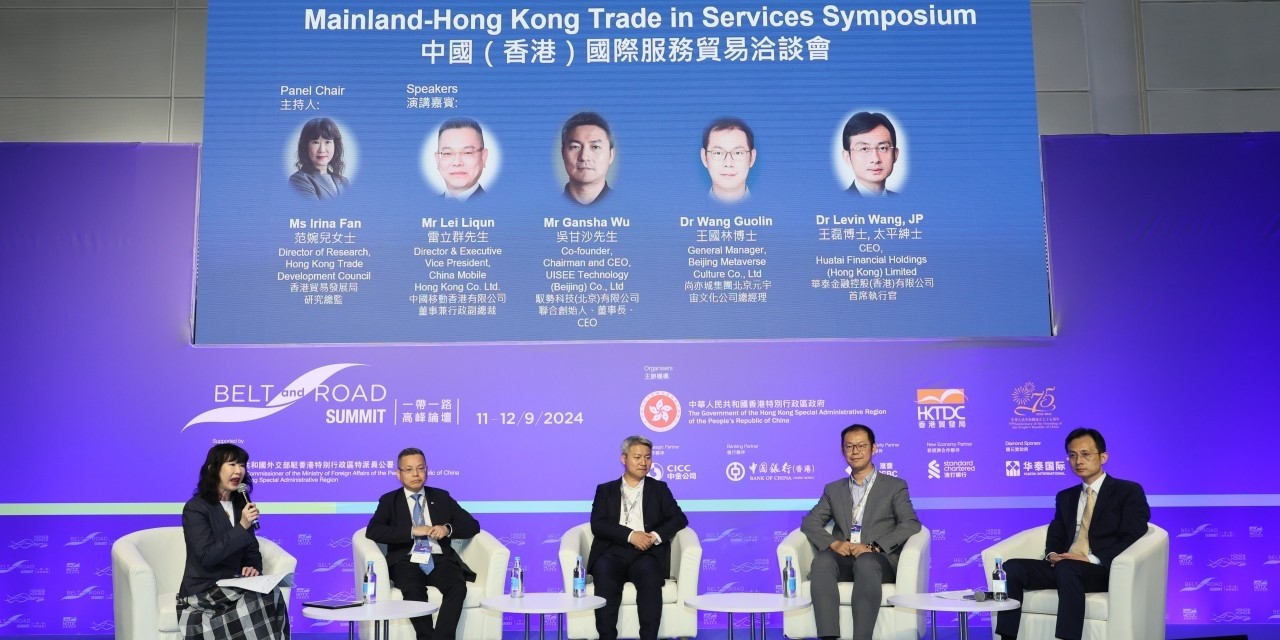
The critical role of Hong Kong as a financing hub for Mainland Chinese companies keen to expand internationally emerged as a strong theme at this year’s Belt and Road Summit in Hong Kong.
At a symposium discussing trade in services, senior executives from mainland-invested technology and finance firms emphasised that Hong Kong’s international business environment acts as a springboard, from which mainland companies can expand into international markets.
Huatai International serves as one such example, an investment firm with roots in the mainland that has expanded globally using Hong Kong as a launchpad.
In his company’s efforts to internationalise and expand, Huatai CEO Dr Levin Wang rated Hong Kong’s financial markets as “absolutely critical” to developing Huatai’s ability to provide equity and debt financing to both Chinese enterprises going abroad and local enterprises in the domestic and overseas markets.
Last year, Huatai International's revenue exceeded HK$10 billion, making it the highest-earning mainland-funded brokerage in Hong Kong and second in the number of IPOs brought to market in Hong Kong.
In fact, a key message from the symposium is that mainland-funded finance companies now play a larger role in Hong Kong financial markets than ever before, accounting for about two-thirds of the market.
According to Dr Wang, Huatai’s success in Hong Kong has given it the confidence to pursue opportunities in markets as diversified as Saudi Arabia, Japan and Southeast Asia.
“As a mainland-based financial company, our role is to support mainland companies with financial services, as they expand abroad.”
“The experience we have gained in Hong Kong’s highly competitive and developed financial markets has given us great confidence in developing cross-border stocks, bonds, commodities and financial derivatives.”
“With the significant opportunities open to companies in the Belt and Road Initiative, Huatai will expand to provide services in the Belt and Road countries and regions.”
Observing that Chinese industrial parks have been set up in Saudi Arabia, Malaysia, Indonesia and other countries, Dr Wang predicts that as Chinese companies start to cluster, their demand for financial services will also increase, providing Huatai with opportunities to explore new markets.
Looking ahead, he suggested that Chinese securities firms should use Hong Kong's unique advantages to capture the continued growth of the middle class in Belt and Road markets and move their business steadily forward.
"We can use Hong Kong as the 'bridgehead' for our internationalisation and a hub to connect across markets.”
“This means first building a good bridge of investment products, second being a good 'tour guide' for overseas clients investing in China and, finally, helping more mainland enterprises to go global”.
Original article published in https://hkmb.hktdc.com
Editor's picks
Trending articles
Thursday 25 April 2019 (Beijing) – It was announced today that 27 global institutions have signed up to a set of voluntary principles – the Green Investment Principles (GIP) for the Belt and Road -- to promote green investment in the Belt &Road region.
The announcement was made at the GIP signing ceremony as part of the Financial Connectivity Forum organized by the People’s Bank of China (the Central Bank) and the Ministry of Finance in Beijing during the second Belt and Road High-level Forum. Deputy Governor Chen Yulu from the People’s Bank of China attended the GIP signing ceremony.
Chen Yulu, Deputy Governor of the People’s Bank of China
As a mandate from the China-UK Economic and Financial Dialogue in 2017, the Green Finance Committee of China Society for Finance and Banking and the City of London Corporation’s Green Finance Initiative led the initiative to develop the GIP, which was first published in London in November 2018. The World Economic Forum, UNPRI, Belt & Road Bankers Roundtable, the Green Belt and Road Investor Alliance and the Paulson Institute are also part of the drafting group. A full list of the principles is provided at the bottom of this release.
Building on existing responsible and ESG investment initiatives, the GIP aims to incorporate low-carbon and sustainable development practices into investment projects in Belt and Road countries, which will host the majority of the world’s infrastructure investments in coming decades.
Since its launch five months ago, the GIP has received strong backing from the global financial industry, including commercial banks, development banks, institutional investors, stock exchanges and other stakeholders that invest or help mobilize investment in the Belt and Road. As of April 25, 2019, twenty-seven institutions have signed up to the GIP. These institutions include (in alphabetical order):
Agricultural Bank of China, Agricultural Development Bank of China, Al Hilal Bank, Astana International Exchange, Bank of China, Bank of East Asia, China Construction Bank, China Development Bank, China International Contractors Association, China International Capital Corporation, Crédit Agricole-CIB, DBS Bank, Deutsche Bank, Export-Import Bank of China, First Abu Dhabi Bank, Habib Bank of Pakistan, Hong Kong Exchanges and Clearing, Industrial and Commercial Bank of China, Industrial Bank, Khan Bank, Luxembourg Stock Exchange, Mizuho Bank, Natixis Bank, Silk Road Fund, Standard Chartered Bank, Trade and Development Bank of Mongolia and UBS Group.
These signatories include all major banks from China that invest in the Belt & Road region and some of the largest financial institutions from (in alphabetical order) France, Germany, Hong Kong, Japan, Kazakhstan, Luxembourg, Mongolia, Pakistan, Singapore, Switzerland, United Arab Emirates and the United Kingdom. Several service providers, including Deloitte, Ernst & Young, KPMG and PWC, have also expressed their support for the GIP.
Ma Jun, Chairman of China’s Green Finance Committee, announced at the GIP signing ceremony that a Secretariat would be established to support future work of the GIP. The GIP Secretariat will work on expanding the membership, the development of implementation tools and case studies, a green project database for the Belt & Road, as well as compiling the progress report.
Chen Yulu, Deputy Governor of the People’s Bank of China, said at the signing ceremony: “The financial institutions represented here today are the leading institutions of green investment for the Belt and Road. I hope that all signatories can seize the great opportunity of the BRI, and actively promote the GIP and enhance their capacity for green investment.”
Dr. Ma Jun said: “The majority of global infrastructure investment in the coming decades will be in the Belt and Road region and they will have a significant impact on the implementation of the Paris Agreement and UN Sustainable Development Goals. The aim of the GIP is to ensure that environmental friendliness, climate resilience, and social inclusiveness are built into new investment projects in the Belt and Road.”
Ma Jun, Chairman of China Green Finance Committee
Catherine McGuinness, Chair of Policy at City of London Corporation commented: “While there is some way to go to ensuring the Belt and Road is truly green, today’s announcement is another step in the right direction, and a powerful statement of intent from financial firms in China, the UK and across the world.”
Catherine McGuinness, Chair of Policy at City of London Corporation
Family photo of major GIP Signatories
David Aikman, Chief Representative Officer of China and Member of the Executive Committee, World Economic Forum, addressed the importance of making GIP an opportunity for green transformation in the region and said: “It will be a shared opportunity for inter-connectivity, environmental friendliness and economic development through green investment in many countries around the world.”
Signatories also expressed their commitment to greening their investment practices with the implementation of GIP. “Business and economic ties between China, Europe, and BRI countries continue to strengthen”, said Werner Steinmueller, Deutsche Bank Management Board Member and Chief Executive Officer for Asia Pacific. “We are one of the most active foreign banks participating in BRI with full corporate and investment banking offerings along the route. By committing to the GIP, we are pledging that we will not only help steer BRI’s open collaboration across countries from China to Europe, but also strive to ensure these projects are as sustainable as possible.”
Gu Shu, President of Industrial and Commercial Bank of China, commented: “Green investments play a critical role in addressing environmental and climate challenges along the Belt and Road. ICBC has participated actively in the drafting of the GIP. We have also invited BRBR members to sign up to the GIP and integrate environmental factors into the BRI-related financing decisions, operations, product development and risk management.”
Gu Shu, President of Industrial and Commercial Bank of China
Bill Winters, Group Chief Executive of Standard Chartered PLC, stated: “We have been supporting our clients in managing their environmental and social risks for decades and are committed to working with all parties to implement the Green Investment Principles and contribute to commerce and prosperity across the Belt and Road markets.”
Benjamin Hung Pi Cheng, Regional CEO of Greater China & North Asia, Standard Chartered
Philippe Brassac, CEO of Crédit Agricole S.A and the Chairman of Crédit Agricole CIB, said: “Today, we reaffirm our ambition to be your long-term banking partner for your energy transition projects. A partner that is both realistic and demanding concerning the climate.”
“As China’s development finance institution and its major bank for the Belt and Road, the China Development Bank will stay committed to green finance, implement green investment principles, increase the provision of green finance, and grow the capacity for green development, to contribute to sustainable economic and social development along the Belt and Road”, said Hu Zhirong, Director of International Finance Bureau of China Development Bank.
Huang Liangbo, Vice President of Export-Import Bank of China, said: “To cater to the needs of the BRI participating parties to conserve resources, protect the environment and cope with climate change, the Export-Import Bank of China has been diversifying its financial products and services related to green projects, and played a major role in investing and financing green infrastructures.”
Lin Jingzhen, Vice President of Bank of China, said: “By signing up to the GIPs, it marks a milestone for Bank of China to integrate green development strategy into our efforts of supporting the construction of the Belt and Road ‘financial artery’. We look forward to working with international counterparts to foster the green and sustainable development along the Belt and Road.”
Qian Wenhui, President of Agricultural Development Bank of China, said: “Agricultural Development Bank of China will gather forces from all sides and assist domestic agriculture-related enterprise and projects to participate in the Belt and Road green investments.”
Tao Yiping, President of Industrial Bank, commented: “By proactively supporting the low-carbon, green and sustainable development of countries along the Belt and Road, GIP will support global financial institutions to establish more extensive and intensive corporations within multilateral frameworks and to increase environmental and social risk management ability.”
Xie Duo, Chairman of the Silk Road Fund, commented: “The Silk Road Fund, being a medium to long-term development and investment fund to support the BRI, is committed to implementing and promoting green investment philosophy, and dedicated to building a green Silk Road.”
Muhammad Aurangzeb, President and CEO of Habib Bank of Pakistan, said: “It is a great initiative taken by China Green Finance Committee and City of London for this GIP signing. As Pakistan’s largest Bank, and the largest executor of CPEC related financing in Pakistan, HBL is positioned to play an integral role towards a greener CPEC, with the ultimate goal of a greener BRI.”
Tim Bennett, CEO of Astana International Exchange, said: “The sign up to the GIP emphasizes the regional perspective of AIX to support infrastructure and economic development in Kazakhstan and in the region in accordance with environmentally and socially friendly international practices.”
Abdulhamid Saeed, Group Chief Executive Officer of First Abu Dhabi Bank, stated: “By becoming one of the first signatories to the GIP, we intend to take a more active role in the Belt and Road Initiative and in supporting global efforts to promote green investments within the UAE and beyond.”
For more information, please contact:
CHENG Lin
China Coordinator of the GIP, China Green Finance Committee
Tel: +86 (10) 8302 1702
Email: lin.cheng@greenfinance.org.cn
Simon Horner
Head of Policy and Innovation, City of London
Tel: +44 (0) 7721 977119
Email: simon.horner@cityoflondon.gov.uk
ANNEX: GREEN INVESTMENT PRINCIPLES FOR THE BELT AND ROAD
Principle 1: Embedding sustainability into corporate governance
We will embed sustainability into our corporate strategy and organisational culture. Our boards and senior management will exercise oversight of sustainability-related risks and opportunities, set up robust systems, designate competent personnel, and maintain acute awareness of potential impacts of our investments and operations on climate, environment and society in the B&R region.
Principle 2: Understanding Environmental, Social and Governance Risks
We will strive to better understand the environmental laws, regulations, and standards of the business sectors in which we operate as well as the cultural and social norms of our host countries. We will incorporate environmental, social and governance (ESG) risk factors into our decision-making processes, conduct in-depth environmental and social due diligence, and develop risk mitigation and management plans, with the help of independent third-party service providers, when appropriate.
Principle 3: Disclosing environmental information
We will conduct analysis of the environmental impact of our investments and operations, which should cover energy consumption, greenhouse gas (GHG) emissions, pollutants discharge, water use and deforestation, and explore ways to conduct environmental stress test of investment decisions. We will continually improve our environmental/ climate information disclosure and do our best to practice the recommendations of the Task Force on climate-related Financial Disclosure.
Principle 4: Enhancing communication with stakeholders
We will institute stakeholder information sharing mechanism to improve communication with stakeholders, such as government departments, environmental protection organizations, the media, affected communities and civil society organizations, and set up conflict resolution mechanism to resolve disputes with communities, suppliers and clients in a timely and appropriate manner.
Principle 5: Utilizing green financial instruments
We will more actively utilize green financial instruments, such as green bonds, green asset backed securities (ABS), Yield Co, emission rights based financing, and green investment funds, in financing green projects. We will also actively explore the utilisation of green insurance, such as environmental liability insurance and catastrophe insurance, to mitigate environmental risks in our operations.
Principle 6: Adopting green supply chain management
We will integrate ESG factors into supply chain management and utilize international best practices such as life cycle accounting on GHG emissions and water use, supplier whitelists, performance indices, information disclosure and data sharing, in our investment, procurement and operations.
Principle 7: Building capacity through collective action
We will allocate funds and designate personnel to proactively work with multilateral organizations, research institutions, and think tanks to develop our organizational capacity in policy implementation, system design, instruments development and other areas covered in these principles.
Editor's picks
Trending articles
The Belt and Road Initiative will bring many opportunities for film and video dubbing, subtitling and related services, says YC Sun of BTI Asia. The global company set up its studio hub in Hong Kong to provide large, international clients with a host of Asian language skills for film and video, with a focus on new markets. The Guangdong-Hong Kong-Macao Greater Bay Area will also offer the chance to break through language barriers.
Speakers:
Y.C. Sun, Managing Director, APAC, BTI Asia
Ho Kwan Wai, Studio Technical Manager, B TI Asia
Louie Fong, Dubbing Director, BTI Asia
Related Links:
Hong Kong Trade Development Council
http://www.hktdc.com
HKTDC Belt and Road Portal
http://beltandroad.hktdc.com/en/



 3505 Views
3505 Views